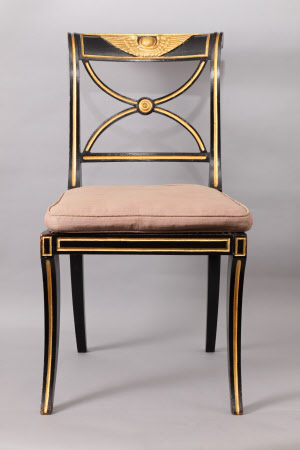Chair
manner of Thomas Hope (1769-1831)
Category
Furniture
Date
circa 1810
Materials
Painted beech, cane, textile
Measurements
88 cm (H); 47 cm (W); 56 cm (D)
Place of origin
London
Order this imageCollection
Gunby Hall Estate, Lincolnshire
NT 637048.6
Summary
A single chair from a set of eight painted and parcel gilt beech and cane seat chairs, after designs by Thomas Hope (1769-1831) London, circa 1810. French Empire style, comprising a pair of open armchairs and six single chairs. Each with a winged orb carved and applied to the top rail and a curved X stretcher held by moulded back stiles, the canes seat raised on sabre legs. The armchairs with moulded S shaped arms terminating in lion's paw feet. The decoration refreshed, the cushions later, four chairs stamped 'M'.
Full description
The chair design reflects the work of the pre-eminent designer Thomas Hope in the early 19th century. Hope was greatly influenced by his extensive Grand Tour travels across Europe as well as Greece, Turkey and Egypt. He published his designs in 1807 with full measurements as a way to encourage accurate imitation of his work. His publication 'Household Furniture and Interior Decoration' was notable for the manner in which it represented furniture designs in outline only, eliminating any sense of depth, shadow, or stylistic contrasts. Hope’s decision to depict his designs in this way reflects his fundamental allegiance to the Neo-classical aesthetic. His work also drew on the French Empire style, largely popularised by Charles Percier and Pierre-François Fontaine, Napoleon’s official architects. They published the first instalment of 'Recueil de Décorations Intérieures comprenant tout ce qui a Rapport à Ameublement' in 1801, a hugely influential pattern book that not only provided the blueprint for the French Empire style but must have influenced other British designers such as George Smith, Charles Heathcote Tatham and Henry Holland, all of whom embarked on Grand Tours to draw ion the influences of ancient Greece, Rome and Egypt. The 'M' stamped onto some of the seat rails is probably that of a journeyman working for a London workshop. (James Weedon, June 2019)
Provenance
Gifted to the National Trust by Field Marshal Sir Archibald and Lady Montgomery Massingberd in 1944.
Makers and roles
manner of Thomas Hope (1769-1831), furniture designer
References
Hope, Thomas - Household Furniture and Interior Decoration 1807 PERCIER, Charles (1764-1838) and Pierre François Léonard FONTAINE (1762-1853). Recueil de décorations intérieures, comprenant tout ce qui a rapport à l'ameublement.
